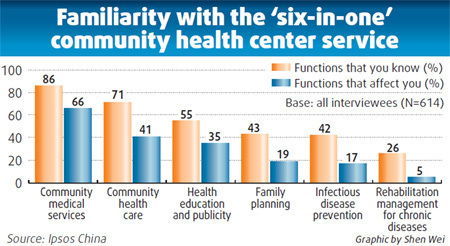
|
BIZCHINA> Top Biz News
 |
|
Healthcare survey finds misconceptions
(China Daily)
Updated: 2009-08-24 08:04
Editor's note: Over the past two decades, the disposable income for rural and urban residents in China has grown by less than 20 times, while their medical expenditures are 133 times higher. The high cost of medicine has become a critical issue in China. The latest health care reforms were administered under the principle of "enabling everyone to enjoy medical insurance". The Implementation Plan for the Recent Priorities of the Health Care System Reform (2009-11) seeks to invest 850 billion yuan over three years to address the problems of "difficult and costly access to health care services". However, a survey by Ipsos, an international market research firm, showed that the majority of Chinese consumers polled have an unclear understanding about the new healthcare reform program and an apparent lack of trust about some community health services. The survey also showed that consumers show strong brand loyalty to medications. The online poll was conducted in June and surveyed 614 netizens between the ages of 18 and 55 in six cities: Beijing, Shanghai, Guangzhou, Chengdu, Wuhan and Shenyang. Here are excerpts of the survey's findings: Community centers Despite active promotion by government agencies, most Chinese consumers lack detailed knowledge about recent healthcare reforms. Although 96.1 percent of the consumers surveyed said they understood the importance of the new healthcare reform policy, many were unfamiliar with the details of that policy.
 The "six-in-one" service function describes the six kinds of services provided by community health centers, including community medical services, community healthcare services, health education and publicity, infectious disease prevention and rehabilitation management for chronic diseases. However, consumers demonstrated a higher level of awareness of the functions of some of those services.
However, more than 70 percent of consumers surveyed were unaware of the institutions' chronic disease management services, and few had actually used these services. Only 22.85 percent of consumers said they only turn to community health institutions for checkups and/or treatment of chronic diseases. Only 28.7 percent said they visit the institutions when they need prescriptions to treat chronic diseases. (For more biz stories, please visit Industries)
|